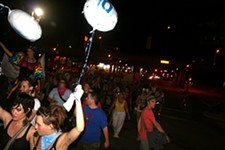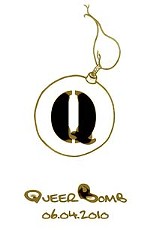Tim Miller Preaches to the Choir
Review of The Lay of the Land at the Vortex Theater
By Steven Cheslik-deMeyer, 11:56PM, Thu. Feb. 4, 2010
I went to see Tim Miller's Lay of the Land at the Vortex on Sunday night. Since the late Eighties, Tim's work has represented the intersection of queer theatre and politics. For the religious fanatics who revile him, and for the artists and activists who revere him, he has been the quintessential queer performance artist for some 25 years. Tim is an icon.
I left the theater disappointed, angry, a little disgusted even. I wanted to write something about the show, but I had a hard time approaching it without sounding whiny and negative and making it all about me and my utopian dreams dying. I have to start by saying that part of the difficulty of knowing how to write about Tim's show is that it's sort of a rule with me to be careful about slagging another artist. It's a hard life, and I feel like we should support each other, y'know? But part of supporting each other is being willing to call each other on our bullshit, right?
So I mulled over my thoughts all day Monday, and I'm still not sure if I have something to say that really holds together, but I'm gonna share some thoughts.
It is not accidental that I see the thread of this show reaching back to Tim's work in the late Eighties. He makes frequent reference to his status as one of the NEA 4. He mentioned that his first Austin appearance was at the Vortex Theater, some 25 years ago. And he has been wearing essentially the same costume the whole time (tank top, shorts, black Doc Martens, i.e., ACT UP drag, 1988). I suspect he does it deliberately in order to suggest some continuity in his work and in its relationship to the gay rights movement, to suggest that our struggle follows a continuous thread; but maybe that's just what he's comfortable wearing on stage. What it does for me, and maybe for anyone who's been here for the long haul, is to emphasize what has changed, what has aged: Tim's hair has gone gray, he's grown thick around the middle, his skin has lost elasticity. I've experienced all those changes in my body too, which I think is why I had such a personal, emotional response to the show. Since I felt such solidarity with Tim and the activism his work was a part of 20 years ago, my response to the show on Sunday made me question what my politics meant back then and what they mean now. Tim's politics have grown soft along with his muscle tone, and that feels like a betrayal.
Maybe I'm projecting something onto Tim's work that was never there. It's been a long time, I should go back and read the earlier stuff. My memory tells me he was, we were, calling for something more radical than what Tim is asking for now: that is, so-called marriage equality, in other words, asking to be let in the gate. I thought we were demanding that the wall be broken down, that possibilities be expanded. I know that's what I was fighting for. But maybe Tim was always just begging for his entitlement and it just seemed more radical back then. Was the whole gay rights movement only about demanding what we felt entitled to? That's what sickens me.
For work that purports to be about politics, Tim's political commentary is not at all sharp; it is even incoherent at times. He makes offhand reference to the immorality of Bush's war in Iraq, but a few minutes later he complains that American soldiers, whom he paints in heroic terms, are kicked out of the military because they are homosexual. No indication at all of any contradiction or irony in the juxtaposition of these facts.
I think the most off-putting aspect of the show is the same thing that I find off-putting about most LGBT activism of the last few years, and about liberal politics in general lately, the assumption that "of course we all agree. Of course we all believe that gay marriage is a civil right and that it should be the main focus of our movement." It's a smug sort of California arrogance, an expectation of consensus, an attitude among privileged people who somehow can't imagine that many people's lives are not exactly like theirs. The message of The Lay of the Land is so mainstream, so conservative, so normative, it might as well be a commercial for the Human Rights Campaign.
He begins the show by reminding us that on election day in 2008, a majority of Californians voted "to take away our civil rights," by voting for Prop 8. It ends with a sort of paean to American democracy and a plea that the U.S. government grant Tim and his husband full citizenship. He frets that he might have to move to Australia because the U.S. won't let his immigrant husband stay here because they're not really married. Poor thing.
Is this what the anger and creativity of my generation is reduced to? Are we really that tired and slack that all we want is to file joint tax returns and be left alone with our American dream, just like the straight people? If this is where my generation has ended up, with this hobbled, compromised vision of what our lives can be, I reject it.
A note to readers: Bold and uncensored, The Austin Chronicle has been Austin’s independent news source for over 40 years, expressing the community’s political and environmental concerns and supporting its active cultural scene. Now more than ever, we need your support to continue supplying Austin with independent, free press. If real news is important to you, please consider making a donation of $5, $10 or whatever you can afford, to help keep our journalism on stands.
Kate X Messer, Nov. 3, 2014
Kate X Messer, Oct. 7, 2013
Carmen Rising, Nov. 12, 2014
Sarah Marloff, Dec. 3, 2013
Politics, Theatre, Art, Activism, Tim Miller, Vortex Theatre, Prop 8, Human Rights Campaign













